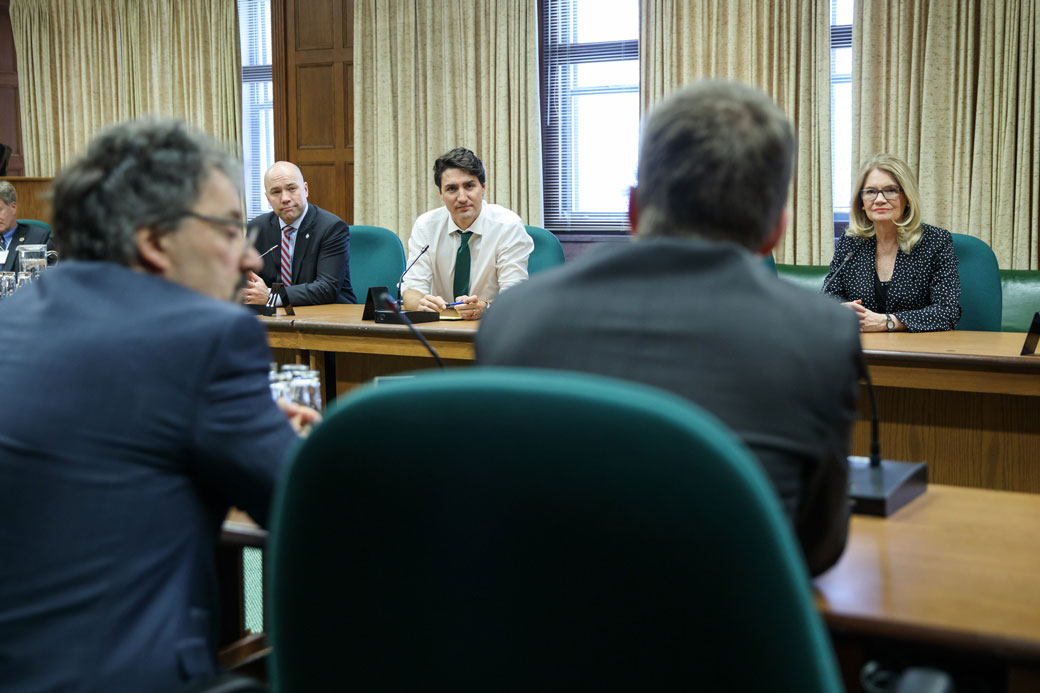Justin Trudeau is worried about extremism entering Canada through the electoral system.
If like Canada, France had a first-past-the-post electoral system, Marine Le Pen of the extreme-right National Front would be well placed to be the next president of France. She has led the polls for months.
Instead, because France has two rounds of voting, with the second round limited to the top two finishers in the first round, Le Pen has next to no chance of winning (regardless if she finishes first or second in the first round).
The National Front is the one party every other French party is prepared to unite against. Leaders of parties left, centre and right expect their supporters to bar the door to a National Front presidency by voting for whichever other candidate comes up against her in the second round of voting.
In France, the popularity of Le Pen (support for her candidacy for president registers just above 25 per cent of the voting public) fascinates and disgusts in about equal measure.
Many French analysts are intrigued by Donald Trump and want to compare and contrast her surprising appeal with his.
As with Trump whose supporters include outright racist Ku Klux Klan types along with anti-Mexican, anti-immigrant and Islamophobic Americans, about one-third of Le Pen supporters are straight racists, anti-Semites and Islamophobes.
These angry militants represent the core of the National Front, a fringe group founded in the early 1970s by her Holocaust-denying father Jean-Marie Le Pen, who Marine Le Pen eventually excluded from party business.
In postwar France, for much of the period until Socialist Party candidate François Mitterrand won a presidential victory in 1981, the Communist Party (PCF) was the leading party in the country.
To the consternation of the French left, many PCF voters now buy into the populist economics of Marine Le Pen and vote National Front.
The Trump victory relied on habitual non-voters in Democratic states such as Wisconsin, Michigan and Pennsylvania getting animated by his populist attacks on banks, pharmaceutical corporations, trade deals and the media.
Trump, a faux populist it turns out, has now buried the idea of reining in Big Pharma. Rather than break up the banks, he is de-regulating them, withdrawing the Dodd-Frank Wall Street Reform and Consumer Protection Act adopted after the financial crash of 2007-2008. He is still attacking the media and his trade agenda is unchanged.
In France, the European Union is even less popular with unhappy voters than it was in the U.K. prior to the Brexit vote. Le Pen makes the most of this with a detailed assault on the EU.
She wants France to leave the Eurozone, re-issue the franc as the national currency and revive an active role for the Bank of France.
Le Pen rightly sees the euro as an undervalued currency for Germany, and over-valued for France (and the European south), creating chaos in trade and investment flows.
Le Pen-style populism is fuelled by the failure of the Socialist government to act on behalf of the French unemployed: seven million today.
Unlike the global neoliberal right (and left), the National Front calls for a massive spending program designed to expand the public sector by issuing government debt, something Eurozone membership rules out.
Donald Trump has slipped easily into neoliberal clothes, aided no doubt by the Heritage Foundation people who got themselves into key roles during his all-important transition into office, and have been recommending like-minded recruits for the thousands of upper-level appointments to the Trump administration.
Justin Trudeau arrived in Washington on Monday with a plan to help Trump polish his image with women. The Trudeau-Trump meeting included a joint Canada-U.S. roundtable of female CEOs to discuss barriers to women in business, and promoting women enterpreneurs.
The Washington visit was labelled the populist-meets-the-feminist summit by the German magazine Der Spiegal, which has emerged as the leading European critique of Trump.
Austerity has made life more difficult for Canadian women. Cuts to social services for the sick, the elderly and children mean that additional care-giving tasks devolve to the home.
Canadian women with no access to public child care outside Quebec are still waiting for action from the feminist prime minister.
Increased access to parliament for women is a major goal of democratic reform; proportional representation (PR) a way to achieve it. Before his trip to Washington and then Europe, the faux feminist prime minister took reform of the first-past-the post voting system off the Canadian agenda.
His rejection of PR is a subject Trudeau stands to hear about in Europe. His fears of it promoting extremism are not going to convince longtime European practitioners that PR needs to be replaced with the Canadian voting system.
Duncan Cameron is former president of rabble.ca and writes a weekly column on politics and current affairs.



